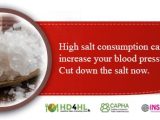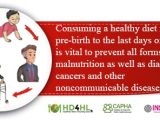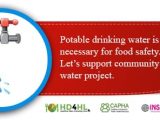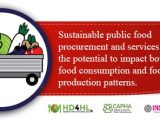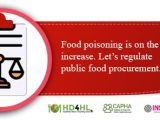
Public Food Procurement & Service Policy
Ensuring Quality Food for All
Uniting Forces: Discover how we are bringing more CSOs to join the Campaign
On July 20th, 2023, the Institute of Leadership and Development (INSLA) hosted an orientation at the Maamobi/Kanda Library in collaboration with the Coalition of Actors on Public Health Advocacy (CAPHA). The event aimed to educate Civil Society Organizations (CSOs) about the WHO Healthy Public Food Procurement and Service Policies (PFP) as part of the Healthier Diets for Healthy Lives (HD4HL) Project. During the workshop, Mr. Anabila, the director of INSLA expressed gratitude to the attendees and highlighted the importance of the project aiming to promote healthy lifestyle among Ghanaians, stressing that INSLA cannot achieve its goals alone.
Mr. Yahaya, the project coordinator, presented on the WHO Public Food Procurement and Service Policies (PEP) Action Framework, which focuses on developing, implementing and monitoring policies to regulate healthier diets. The policy will directly tackle public food procurement and services. He further stated that this procurement and services policy aims to ensure sustainable diets, food safety and adequate macro- and micronutrient intake to prevent all forms of malnutrition, the policies ensure that food the government purchases, serves, and/or sells in and through public institutions meet healthy nutrition standard. He emphasized the need to address unhealthy diets, which are linked to millions of deaths annually and a significant burden of non-communicable diseases (NCDs). He also stressed that it is not enough to talk about unhealthy foods in the market but there is a need to put in place a policy to regulate procurement and services in public foods to ensure that foods meet basic dietary standards for a healthy life. Mr. Yahaya outlined core principles for promoting healthy diets, including limiting sugars, shifting fat consumption, and increasing the intake of nutritious foods.
Mr. Issah Ali, the project manager, further urged CSOs to prioritize and advocate for healthy diets, stressing the importance of public awareness and the potential impact of such policies on public health. The forum concluded with participants unanimously supporting the need for policy sensitization and committing to raise awareness in their communities.
A link to the story published on Ghana News Agency →
Stay informed with our campaign and educational messages on the policy
Catch the talk: here is our expert discussion on the public food procurement and service policy
The radio interview took place on the 30th of September 2023 at the Original FM in Accra.
During the show, Mr. Anabila detailed the WHO's PFP Action Framework, which was developed to promote the adoption of a policy by the government to facilitate healthy and sustainable diets, food safety, and adequate macro- and micronutrient intake to prevent all forms of malnutrition. He added that the policies ensure that the food the government purchases, serves, and/or sells in and through public institutions meets healthy nutrition standards. He continued to state that unhealthy diets are the major causes of non-communicable diseases (NCDs) leading to millions of disabilities and mortality. He further explained that the WHO Public Food Procurement and Service Policies Action framework is a document that seeks to support countries to develop, implement, assess compliance, and evaluate the effectiveness of a healthy public food procurement and service policy.
He highlighted five core principles for healthy diets, including limiting sugars and saturated fats, reducing sodium intake, increasing consumption of whole grains and fruits, and ensuring access to safe drinking water. He concluded the discussion by stating that when the government and people are procuring food for public institutions, the conditions and environment of the food should be in the best forms. He also advised against practices like galamsey to protect water quality. The host, Mr. Ahwireng, thanked INSLA for their insights and encouraged listeners to adopt healthy eating habits.
Learn more about the policy through our insightful virtual webinars
On November 30th, 2023, INSLA hosted a webinar titled “Is Ghana Adhering to the Global Principles of Healthy Diets”. INSLA Director Mr. Anabila opened the session by thanking the attendees and acknowledging the Coalition of Actors in Public Health Advocacy (CAPHA) for their support. He highlighted the goals of the Healthier Diets for Healthy Lives (HD4HL) Project and emphasized the importance of consuming healthy diets to prevent non-communicable diseases (NCDs). Miss Akua Tandoh, a doctoral student and project associate, provided an overview of the HD4HL project, discussing its objectives and the current state of public food procurement in Ghana. She outlined the project’s phases and work packages, which include developing policies on food marketing, labeling, and procurement, and stressed the need for evidence-based action to promote healthier diets. Mr. Suleiman Yahaya, the project coordinator, presented on the importance of public food procurement and service policies in promoting healthy diets. He explained that such policies set criteria for the sale and service of food in public settings to improve nutritional standards and limit unhealthy food options. Mr. Yahaya called for collective action from civil society organizations, media, and individuals to raise awareness and advocate for the adoption of these policies. Dr. Dodoo from the Ministry of Health’s Policy Unit suggested aligning the new policies with existing frameworks to ensure consistency and effectiveness.
Does your organization have a demonstrated commitment to public health promotion and advocacy? Can your organization contribute expertise, resources, or networks that will strengthen CAPHA's capacity to influence public health policy and educate communities? Is your organization willing to collaborate actively with other coalition members, sharing knowledge and participating in joint efforts to achieve broader public health objectives?

